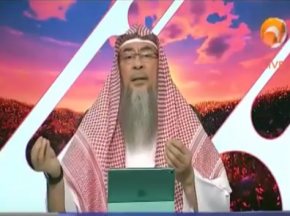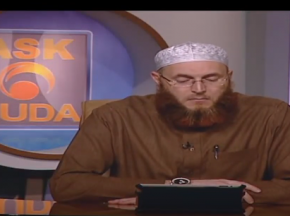content of level
Having a dog is losing good deeds everyday equal to the weight of mount uhud
Having a dog is losing good deeds everyday equal to the weight of mount uhud - Assim al hakeem.
Do Women have to cover head during Adhan?
Do Women have to cover head during Adhan, when eating, going 2 toilet, making wudu, read Quran Assim
What do followers say behind the imam?
What do followers say behind the imam? Allahu Akbar, Sami Allah huliman hamida etc - Assim al hakeem.
What happens to our soul between our Death and Resurrection?
What happens to our soul between our Death and Resurrection? - Assim al hakeem.
How to deal with Abusive People?
How to deal with Abusive People? - Assim al hakeem.
Can I mix the number of times I wash in wudu, wash face once and arms 2 or 3 times?
Can I mix the number of times I wash in wudu, wash face once and arms 2 or 3 times?- Assim al hakeem
Awliya in Islam?
Concept of Awliya Allah in Islam, do they have special powers granted to them by Allah Assim Alhakeem.
Can a woman in menses, period enter Masjid, what if her Quran classes are held there?
Can a woman in menses, period enter Masjid, what if her Quran classes are held there?- Assim Alhakeem.
Doing good deeds out of fear of people
Doing good deeds out of fear of people : Shirk or Kufr (Riya)? - Assim al hakeem
How to pray Eid Prayer, Is it mandatory?
How to pray Eid Prayer, Is it mandatory, Where to pray it, Must travelers pray Eid Prayer- Assim Alhakeem
Is there any special reward for being buried in Jannatul Baqi or Jannatul Mualla?
Is there any special reward for being buried in Jannatul Baqi or Jannatul Mualla? - Assim al hakeem.
Praise Allah & Durood (Salutations) before making dua
Praise Allah & Durood (Salutations) before making dua, should we do this in Salah as well.
Is going to a doctor Shirk as cure comes only from Allah?
Is going to a doctor Shirk as cure comes only from Allah? - Assim al hakeem.
How can a woman avoid free mixing when visiting family in a joint family?
How can a woman avoid free mixing when visiting family in a joint family? - Assim al hakeem
Does Laughing or Smiling nullify your Prayer?
Does Laughing or Smiling nullify your Prayer? - Assim al hakeem.
What To Teach Kids?
What To Teach Kids?
Is it permissible to draw sketches
Is it permissible to draw sketches.
shortening the prayer
A revert sister asks about shortening the prayer.
Is fasting the 10 days of dhul hijjah an authentic sunnah
Is fasting the 10 days of dhul hijjah an authentic sunnah.
Ruling on following the imam from outside the mosque
Ruling on following the imam from outside the mosque or following a prayer by listening to TV or radio.




















